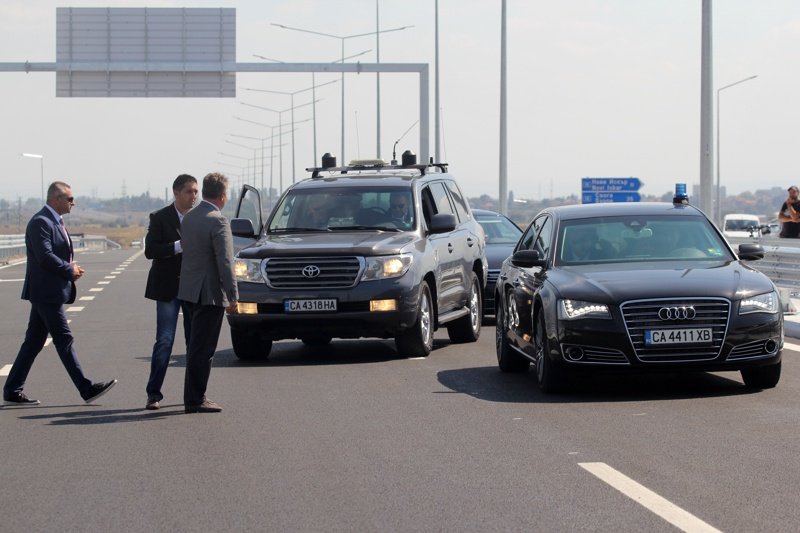The National Service for Protection is a national security agency, providing protection for top-level state officials. Although its primary functions are the security of the president, prime minister and speaker of parliament, the law allows for the agency to provide security for "other" state officials as well, if the agency or a special council decides their safety is relevant to national security. The NSP decision-making process is ambiguous enough while its aptitude to give public account of its activities is virtually nonexistent. Given its role as a state-operated security service provider, the organization tends to cite state secrets to justify not releasing specifics as to how many people they provide security for and on what grounds.
A prime example for this organization’s promiscuous spending is providing the honorary leader of the Movement for Rights and Freedoms (DPS) Ahmed Dogan and DPS MP and media mogul Delyan Peevski with security details. On paper it seems odd: Dogan isn’t even a public servant, while in his role as MP Peevski is best known for not attending Parliament sessions at all, save for the swearing-in ceremonies and no more than a several other occasions, which become top news stories of the news cycle. It only makes sense given their behind-the-scenes roles of having the last word in all state matters. The NSP have refused to provide the public with estimates of how much Dogan’s and Peevski’s security is costing taxpayers.
Dogan and Peevski are not the only expenditure worth looking into. NSP is an overblown cost, which cannot be justified least of which because its decisions to expand its services cannot be examined or assessed. The organization’s budget grows by a few million every year. In 2020 NSP will spend at least 44 million leva. Most of those are personnel costs (3,7 million). Last year cars, owned by the NSP have driven a total of 2,5 million kilometers. The astonishing amount of money, man hours, vehicles and kilometers reported virtually cannot be accounted for and properly audited.
As Peevski and Dogan have been pointed to as prime examples for the misuse of the organization, an idea to ‘reform’ it came from them. First DPS’s leader, Mustafa Karadaya, admitted a month ago that DPS provides the cars for Dogan and Peevski while NSP takes care of the personnel expenses. On its own, the admission is as bizarre as it is worrying. The state agency, which provides security for top-level state officials should enter into semi-legitimate transactions for providing their service. Justifying Peevski and Dogan’s security details by providing part of the logistics means the NSP has entered into a relationship whereby private actors essentially have paid it for a service. Some might call Karadaya’s admission as a gaff. But several weeks later DPS doubled down and introduced a bill to Parliament to allow Peevski and Dogan to pay the NSP for providing their security. According to the bill, anyone other than the PM, speaker of parliament, president and vice presidents could only have protection from the NSP if they pay for it.
The idea to semi-privatize the NSP raises a lot of concerns. The NSP is not an ordinary security service provider. While its very existence should be up for debate altogether, as long as it does, its services should not be up for sale. Dogan and Peevski could afford all the security money can buy. But their primary detail is NSP. The reason – just as Karadaya said himself – is that as a national security organization related to national security the NSP has special rights and access to resources. The extraordinary status of this organization makes it unique and without analogue in the private sector. What DPS is proposing is to liberalize a special security service in order to gain unlimited access to it. In effect, if passed the bill will eliminate any cause to provide justification why this or that individual uses the NSP for their personal security needs. The decision will be left entirely to the client.
The problem with the enormous budget of the NSP is not strictly a money problem – as DPS try to make it seem. And because it is not a money problem, it will not be solved by plunging more money on it – which by the way also would be taxpayers’, but via a different route.
The problem is the expanse of the activities. In this context, the bloated budget is a mere symptom and DPS’s proposal will only worsen the situation. Instead the NSP should limit its service significantly: both in terms of number of people it provides security to and the recourse it spends on each case.
Ключови думи
За честна и независима журналистика
Ще се радваме, ако ни подкрепите, за да може и занапред да разчитате на независима, професионална и честна информационно - аналитична медия.
 0 коментара
0 коментара
Екипът на Mediapool Ви уведомява, че администраторите на форума ще премахват всички мнения, съдържащи нецензурни квалификации, обиди на расова, етническа или верска основа.
Редакцията не носи отговорност за мненията, качени в Mediapool.bg от потребителите.
Коментирането под статии изисква потребителят да спазва правилата за участие във форумите на Mediapool.bg
Прочетете нашите правила за участие във форумите.
За да коментирате, трябва да влезете в профила си. Ако нямате профил, можете да се регистрирате.




